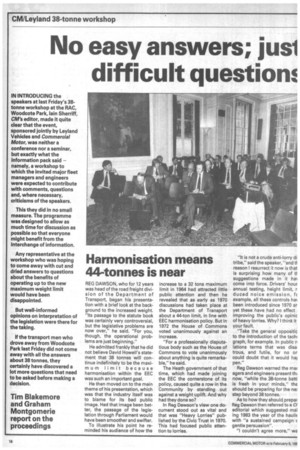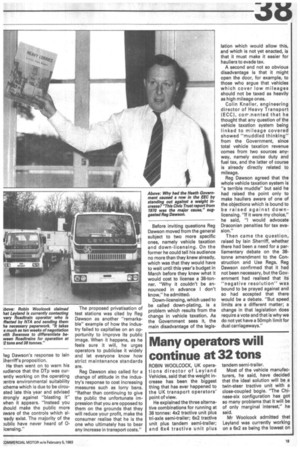Harmonisation means 44-tonnes is near
Page 20

Page 21

If you've noticed an error in this article please click here to report it so we can fix it.
REG DAWSON, who for 12 years was head of the road freight division of the Department of Transport, began his presentation with a brief look at the background to the increased weight. "Its passage to the statute book was certainly very controversial, but the legislative problems are now over," he said. "For you, though, the operational problems are just beginning."
He admitted frankly that he did not believe David Howell's statement that 38 tonnes will continue indefinitely to be the maximum limit because harmonisation within the EEC was such an important goal.
He then moved on to the main theme of his presentation, which was that the industry itself was to blame for its bad public image. Had that image been better, the passage of the legislation through Parliament would have been smoother and swifter.
To illustrate his point he reminded his audience of how the increase to a 32 tons maximum limit in 1964 had attracted little public attention and then he revealed that as early as 1970 discussions had taken place at the Department of Transport about a 44-ton limit, in line with EEC harmonisation policy. But in 1972 the House of Commons voted unanimously against an increase.
"For a professionally disputatious body such as the House of Commons to vote unanimously about anything is quite remarkable," he said.
The Heath government of that time, which had made joining the EEC the cornerstone of its policy, caused quite a row in the Community by standing out against a weight uplift. And why had they done so?
In Reg Dawson's view one document stood out as vital and that was "Heavy Lorries" published by the Civic Trust in 1970. This had focused public attention to lorries.
"It is not a crude anti-lorry di tribe," said the speaker, "and Vreason I resurrect it now is that is surprising how many of tr suggestions made in it ha \ come into force. Drivers' hour annual testing, height limit, r duced noice emission, fr example, all these controls ha\ been introduced since 1970 ar yet these have had no effect improving the public's opinic of heavy lorries. Why? I think it your fault.
"Take the general oppositic to the introduction of the tachl graph, for example. In public n lations terms that was disa: trous, and futile, for no or could doubt that it would hal pen."
Reg Dawson warned the mar agers and engineers present thr now, "while the 38-tonne battl is fresh in your minds," the should be preparing for the ne) step beyond 38 tonnes.
As to how they should prepar Reg Dawson then referred to a CI editorial which suggested mal ing 1983 the year of the haulif with "a sustained campaign gentle persuasion".
"I couldn't agree more," wa leg Dawson's response to lain iherriff's proposition.
He then went on to warn his iudience that the DTp was curently working on the operating ;entre environmental suitability ;cheme which is due to be circuated late this year and advised ;trongly against "blasting it" when it appears. "Instead you ;hould make the public more iware of the controls which aleady exist. The majority of the )ublic have never heard of 0icensing." The proposed privatisation of test stations was cited by Reg Dawson as another "remarkable" example of how the industry failed to capitalise on an opportunity to improve its public image. When it happens, as he feels sure it will, he urges operators to publicise it widely and let everyone know how strict maintenance standards are.
Reg Dawson also called for a change of attitude in the industry's response to cost increasing measures such as lorry bans. "Rather than continuing to give the public the unfortunate impression that you are opposed to them on the grounds that they will reduce your profit, make the consumer realise that he is the one who ultimately has to bear any increase in transport costs." Before inviting questions Reg Dawson moved from the general subject to two more specific ones, namely vehicle taxation and down-licensing. On the former he could tell his audience no more than they knew already, which was that they would have to wait until this year's budget in March before they knew what it would cost to license a 38-tonner. "Why it couldn't be announced in advance I don't know," he admitted: Down-licensing, which used to be called down-plating, is a problem which results from the change in vehicle taxation. As the Government sees it, the main disadvantage of the legis lation which would allow this, and which is not yet enacted, is that it must make it easier for hauliers to evade tax.
A second and not so obvious disadvantage is that it might open the door, for example, to those who argue that vehicles which cover low mileages should not be taxed as heavily as high mileage ones.
Colin Kneller, engineering director of Heavy Transport (ECC), commented that he thought that any question of the vehicle taxation system being linked to mileage covered showed "muddled thinking" from the Government, since total vehicle taxation revenue comes from two sources anyway, namely excise duty and fuel tax, and the latter of course is already directly related to mileage.
Reg Dawson agreed that the whole vehicle taxation system is "a terrible muddle" but said he had raised the point only to make hauliers aware of one of the objections which is bound to be raised against downlicensing. "If it were my choice," he said, "I would advocate Draconian penalties for tax evasion."
Then came the question, raised by lain Sherriff, whether there had been a need for a parliamentary debate on the 38tonne amendment to the Construction and Use Regs. Reg Dawson confirmed that it had not been necessary, but the Government had realised that its "negative resolution" was bound to be prayed against and so had accepted that there would be a debate. "But speed limits are a different matter; a change in that legislation does require a vote and that is why we do not yet have a 50mph limit for dual carriageways."












































































































